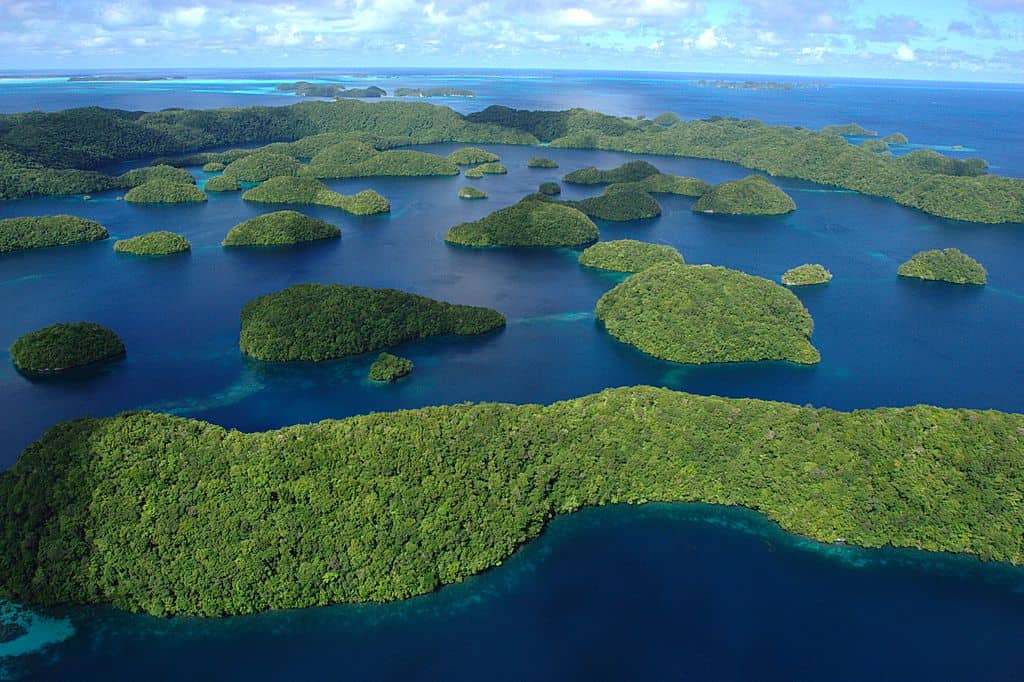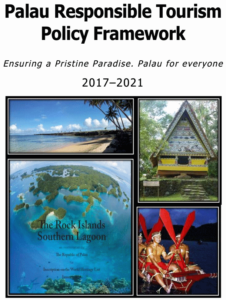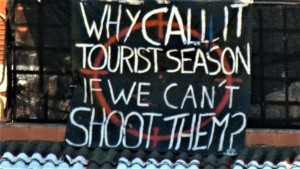Palau tackles over-tourism with responsible tourism

According to Republic of Palau President Tommy E Remengasau, Jr, in his introductory message for the Palau Responsible Tourism Policy Framework 2017 – 2021 (PDF 3 MB), Palau will combine “traditional knowledge with innovative management and best practices to present Palau as a special destination to be respected, understood, and highly valued”.
Nowhere in the President’s message, nor anywhere else in the 45-page Framework, is the trending buzzword “over-tourism” used. The key words here are “highly valued”, which are echoed by Umiich Sengebau, Minister, Natural Resources, Environment and Tourism, in his foreword to the Framework:
To achieve long-term industry profitability and sustainability, Palau must consistently deliver the Pristine Paradise our visitors expect while facilitating economic growth. This requires a shift from the unmanaged approach to tourism development that has characterized the sector thus far. It requires that we embrace and embark on a strategy that invests in high-value growth instead of high-volume growth.
As a reformed addict might tell you, the first step to overcoming a problem such as over-tourism is acknowledging you have a problem. In 2015, when reports of a backlash against Chinese tourists emerged from Palau, President Remengesau told reporters: “Do we want to control growth or do we want growth to control us? It will be irresponsible for me as a leader if this trend continues. I am not only looking at the present but, as a leader, I am looking after tomorrow.”
If the Palau Responsible Tourism Policy Framework 2017 – 2021 is any indication, Palau has quickly learned from its brush with mass tourism. And it is unafraid to describe what it experienced, how it happened, and why it should not be tolerated in future:
Before 2014, Palau’s tourism industry was driven largely by higher spending consumer segments dominated by the diving market. In 2014 and 2015, a dramatic spike in packaged travel groups from the Peoples Republic of China (PRC) changed the nature of the tourism experience in Palau. This shift into mass-market tourism has been driven by vertically integrated package tours, bringing visitors who have prepaid their full itinerary, resulting in lower in-country visitor spending. Additionally, the dominance of a single source market, largely consisting of first-time travelers and the entry of numerous new, inexperienced tour operators into the tourism sector have strained the capacity of regulatory and management bodies to ensure that tourism in Palau is both profitable and sustainable.
Issues stemming from erratic air service schedules, a proliferation of charter flights, and a lack of transparency in airport operations have challenged Palau’s tourism sector to target and receive desired visitor markets via consistently scheduled air service.
Hotel development projects aimed to service the low-end packaged traveler have cluttered the market and degraded Palau’s pristine brand. To make matters worse, Palau’s identity as an exclusive world-class diving destination is eroding, due to significant overcrowding at key sites.
Resolving these issues is crucial. Resolution will require the political will of the ROP government and a coordinated industry. The Responsible Tourism Policy outlines the way forward. We must all pull together to implement needed solutions.
Political will and a determination to intervene and disrupt and regulate the free market with (hopefully) the support of a “coordinated industry”. Fantastic!
However, this rhetoric must be matched by policy, and it is here too that Palau appears to be strong. For example, here are the four sensible policy objectives that are intended to meet Goal 2: “Visitor-to-resident ratio reflects sustainable carrying capacity”:
- Objective 2.1 Sustainable carrying capacity ranges are established, determining acceptable levels of environmental, cultural, and community impacts.
- Objective 2.2 Airline access is closely aligned with carrying capacity, accommodation stock, and targeted markets.
- Objective 2.3 User fees levied appropriately assist in reduction of low-end markets.
- Objective 2.4 Strengthened visitor communication and outreach ensures that all visitors are provided with clear and compelling information about respectful, appropriate behavior and environmental dos and don’ts.
The Framework is also firm on the importance and value of niche tourism markets:
[Niche tourism markets] support value growth over volume growth, target a more engaged traveler who seeks new, authentic experiences as opposed to low-budget sun-and-sea mass tourism. […] Niche tourism has the potential to enhance the competitiveness of destinations, diversify its product offerings, generate higher yields per visitor, and create more jobs for locals. Examples of niche markets include nature-based tourism, cultural heritage tourism, culinary tourism, agri-tourism, sports tourism, weddings and honeymoons, and adventure tourism.
This interest in niche markets is reflected in policy objectives designed to meet Goal 3: “Diverse, high-value, low-impact consumer segments are the core of Palau’s visitor industry”:
- Objective 3.1 The development of accommodations, services, and experiences that meet the market demands and expectations of high-value visitors such as Free Independent Travelers (FITs) and targeted niche markets such as birding, soft adventure, cultural heritage, private cruising, ecotourism, etc., is prioritized.
- Objective 3.2 Marketing activities focus on a variety of high-performing, niche and diverse geographic source markets in pursuit of highest-value customers — those who stay the longest and spend the most.
Published in December 2016, the Palau Responsible Tourism Policy Framework 2017 – 2021 sets six targets/goals from which key policy objectives and measurable outcomes flow. Collectively they position Palau’s tourism industry as a community-driven national priority that is responsibly managed according to a sustainable carrying capacity of diverse, high-value, low-impact travellers who come to experience the authentic and alive Pristine Paradise brand.
So as senior figures prepare for the grandly-named UNWTO & WTM Ministers’ Summit, will they, like Palau, take the issue of “over-tourism” seriously? Are they, in their own destinations, willing to meddle with the free market? Are they prepared to specify a carrying capacity target for their destinations and aim for it? Will they consider measures that discriminate against low-budget travellers and all-inclusive tours? Will they favour small local tourism businesses over large multinational tourism businesses?
Thanks to a leader who claims to be “looking after tomorrow” and a policy framework that uses the language of sustainability and responsibility, tackling and pre-empting over-tourism is all to be done in Palau. And, for Palauans’ sake, hopefully it will be.
Featured image: A scattering of islands in Palau. By LuxTonnerre (CC BY 2.0) via Wikimedia.
Download
Palau Responsible Tourism Policy Framework 2017 – 2021 (PDF 3 MB)
Related posts






